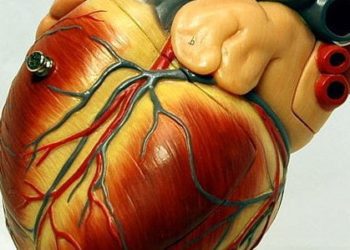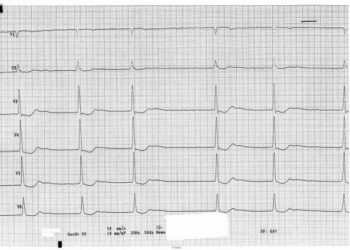Reperfusion therapy may be suboptimal for STEMIs requiring transfers
1. Based on data from the Acute Coronary Treatment and Intervention Outcomes Network Registry–Get With the Guidelines (ACTION Registry-GWTG), only one-half of all patients who required transfer for STEMI received primary percutaneous coronary intervention (pPCI) within 120 minutes. As the drive time increased to between 30 and 120 minutes, fewer than one-half of patients received pPCI in optimal time.
2. For the subset of patients who were between 30 and 120 minutes of driving time away from a PCI-center, in whom either fibrinolysis or pPCI would be appropriate, there was no difference in mortality or major bleeding observed between the two reperfusion strategies, although bleeding risk was higher for those who received fibrinolysis first and then required rescue PCI.
Evidence Rating Level: 2 (Good)
Study Rundown: Primary percutaneous coronary intervention (pPCI) within 120 minutes of first medical contact is the current recommendation for ST-segment elevation myocardial infarctions (STEMI). Fibrinolysis is also a reperfusion strategy that can be employed if the hospital does not have PCI capabilities and travel time to the nearest center is long. This study was conducted to determine the timeliness of care and outcomes associated with the two reperfusion strategies based on interhospital driving time. The study, which used data from the Acute Coronary Treatment and Intervention Outcomes Network Registry–Get With the Guidelines (ACTION Registry-GWTG), showed that about half of the patients who required transfer received pPCI within optimal time. As the drive time increased to between 30 and 120 minutes, less than half of patients received pPCI in optimum time. For the subset of patients who were between 30 and 120 minutes of driving time away from a PCI-center, in whom either fibrinolysis or pPCI would be appropriate, there was no difference in mortality or major bleeding observed between the two reperfusion strategies, although bleeding risk was higher for those who received fibrinolysis first and then required rescue PCI.
One major advantage of the study is that the data is derived from a large, nationally representative sample, which makes the results generalizable for many transfer and receiving hospitals (though only hospitals that were a part of the registry were included in the trial). There are a significant number of confounding variables, such as actual transfer times for individual patients and certain patient characteristics that may influence physician choices for reperfusion therapy.
Click to read the study, published today in JAMA Internal Medicine
Relevant Reading: Fibrinolysis or primary PCI in ST-segment elevation myocardial infarction
In-Depth [retrospective cohort]: The data for this study comes from the National Cardiovascular Data Registry (NDCR) Acute Coronary Treatment and Interventions Outcomes Network Registry-Get With the Guidelines (ACTION Registry-GWTG). Data was collected from 2008 to 2012, and the final analysis included 2,478 pairs of transferring and receiving STEMI centers with 22,481 patients involved.
In all, 51.3% of patients achieved the recommended door-to-balloon (DTB) time of 120 minutes. When driving time increased to 30-120 minutes, only 42.6% achieved the optimum DTB time, and for 60-120 minutes of driving time, only 29.6% achieved the optimum time. For the cohort of patients who were between 30 and 120 minutes driving time, in whom either reperfusion strategy could be appropriate, there was no significant difference in in-hospital mortality for patients who received fibrinolysis compared to pPCI (OR 1.13; 95%CI 0.94-1.36). The bleeding risk was higher for those patients who received pre-transfer fibrinolysis if they subsequently required rescue PCI (OR 1.44; 95%CI 1.22-1.70) compared with pPCI. There was no difference in bleeding risk between the two reperfusion strategies if rescue PCI was not needed (OR 0.93; 95%CI 0.72-1.19).
More from this author: Basic life support associated with greater survival in cardiac arrest, Cardiac biomarkers unnecessarily ordered in emergency departments, Secondhand smoke exposure counseling may be insufficient amongst cardiology inpatients, Dabigatran linked with more major bleeds, fewer intracranial hemorrhages vs warfarin, Non-invasive ventilation linked with lower mortality in COPD exacerbations
Image: CC/GNU Free
©2014 2 Minute Medicine, Inc. All rights reserved. No works may be reproduced without expressed written consent from 2 Minute Medicine, Inc. No article should be construed as medical advice and is not intended as such by the authors, editors, staff or by 2 Minute Medicine, Inc.





![Ivabradine ineffective in stable coronary artery disease [SIGNIFY trial]](https://www.2minutemedicine.com/wp-content/uploads/2014/09/800px-RCA_atherosclerosis-75x75.jpg)

